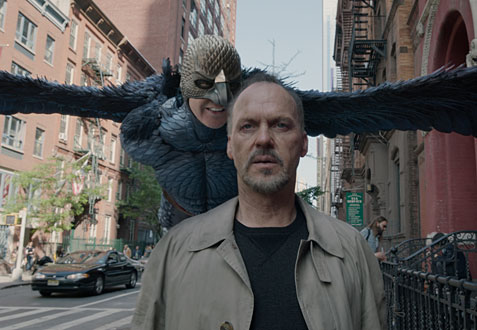Movie Review: “Birdman or (The Unexpected Virtue of Ignorance)”

Alejandro Gonzalez Iñarritu was part of the Mexican Invasion that took Hollywood by storm in the early naughts alongside such visionaries like Guillermo del Toro and Alfonso Cuarón. But after his little-seen 2010 drama “Biutiful,” he went on an unexpected sabbatical that left many wondering if he’d ever return. Iñarritu spent the last four years licking his wounds over the mixed reception of that film (as well as globe-trotting Oscar bait “Babel”), but he’s officially back with what’s arguably his best movie to date: “Birdman or (The Unexpected Virtue of Ignorance),” a daring piece of filmmaking that’s as refreshingly original as it is wildly ambitious. The movie doesn’t always work – in fact, it’s sometimes as messy as the characters that inhabit it – but it’s also the type of magical cinematic experience that, just like fellow countryman Cuarón’s “Gravity,” you can only gaze in childlike wonder as it unfolds before you.
Michael Keaton stars as Riggan Thomson, a washed-up actor best known for playing a superhero called Birdman in a series of successful Hollywood blockbusters. Desperate to revive his career and earn a little credibility in the process, Riggan mounts an adaptation of the Raymond Carver short story “What We Talk About When We Talk About Love” on Broadway. When one of the actors is injured in a freak accident, Riggan’s indebted co-star, Lesley (Naomi Watts), recommends her boyfriend and theater luminary Mike Shiner (Edward Norton) as a last-minute replacement. There’s no denying that Mike is a talented actor, but his unconventional methods lead to a clash of egos between him and Riggan, and with only days to go until opening night, the whole production becomes in danger of shutting down before it even begins – especially if the cynical and malicious voice in Riggan’s head (a manifestation of his Birdman alter ego) has anything to say about it.
On the surface, “Birdman” is a razor-sharp satire of Broadway and fame (when one of the play’s stars asks, “Why don’t I have self-respect?” another blithely replies, “You’re an actress, honey”), but it goes much deeper than that, digging into themes of ego, family and artistic integrity vs. commercial success. More than anything else, though, the movie operates as a character study of a broken man trying to reclaim his former glory, and in that regard, it reminded me a lot of Darren Aronofsky’s “The Wrestler.” But whereas that film featured an excellent performance within a mediocre story, “Birdman” has many more layers to its narrative, both as a piece of sly meta-fiction (not only in the parallels between Riggan’s life and Carver’s story, but also Riggan and Keaton’s careers) and in the psychological breakdown of its main character. Some of it is played for laughs – and for a director not known for comedy, it can be incredibly funny at times – but it’s mostly a profoundly sad look at one man’s struggle to validate his existence, so troubled by the need for admiration that he even attempts suicide in his fantasies.
It’s a difficult balance to strike, which is why it was essential to cast the right actors, and there’s not a single weak link among them, from its leading man, to bit players like Naomi Watts, Andrea Riseborough, Amy Ryan and Zach Galifianakis. “Birdman” might just be the best thing that Keaton has ever done, completely baring himself (figuratively and literally, as evidenced in the scene where Riggan frantically scampers through Times Square in only his tighty whities) to a degree that we’ve never seen before, and he seems poised to earn his first Oscar nomination for his committed performance. He’s not the only one who delivers award-caliber work, either. Edward Norton nearly steals the show as the pretentious Method actor with a flair for bad boy behavior, and Emma Stone showcases her emotional range as Riggan’s estranged daughter, a recovering drug addict now working as his personal assistant.
But while the acting is top-notch across the board, the real magic comes from Iñarritu and cinematographer Emmanuel Lubezki’s decision to stage the movie in a way that makes it look like one long tracking shot using a combination of practical camera tricks, digital effects and carefully choreographed scenes that create the illusion it was filmed in a single take. It’s a technical marvel that rivals the groundbreaking work that Lubezki did on “Gravity,” resulting in a more immersive and seamless viewing experience more akin to a theater performance. The balletic precision and sheer ballsiness required to even pull that off is mind-boggling, and it definitely changes the way that the audience responds to the material compared to more traditional means.
Though the movie starts to unravel a bit in the final act as the more gonzo components (like Riggan’s alter ego and delusional telekinetic abilities) bleed into the story, it’s actually quite brilliant in how it mirrors Riggan’s own downward spiral, no matter how deranged those moments (particularly the ambiguous ending) may be. Some of the showbiz satire is also a little too on the nose, but that hardly takes away from what Iñárritu has accomplished. “Birdman” isn’t perfect by any means, but you can be certain that you won’t see another film like it all year. And while better movies are surely still to come, it’s this nutty yet innovative dark comedy that will likely stick with you the longest.
















